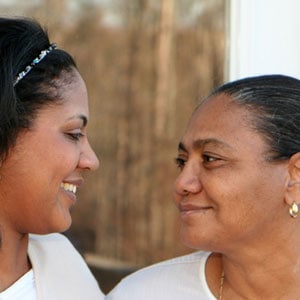
What Makes Your Family Unusual
Author Tim Stafford, a senior writer for Christianity Today, talks about the differences that make each family a unique and special entity.
Show Notes
About the Host
About the Guest
-
Author Tim Stafford, a senior writer for Christianity Today, talks about the differences that make each family a unique and special entity.
-
Dave and Ann Wilson
Dave and Ann Wilson are hosts of FamilyLife Today®, FamilyLife’s nationally-syndicated radio program. Dave and Ann have been married for more than 38 years and have spent the last 33 teaching and mentoring couples and parents across the country. They have been featured speakers at FamilyLife’s Weekend to Remember® marriage getaway since 1993 and have also hosted their own marriage conferences across the country. Cofounders of Kensington Church—a national, multicampus church that hosts more than 14,000 visitors every weekend—the Wilsons are the creative force behind DVD teaching series Rock Your Marriage and The Survival Guide To Parenting, as well as authors of the recently released book Vertical Marriage (Zondervan, 2019). Dave is a graduate of the International School of Theology, where he received a Master of Divinity degree. A Ball State University Hall of Fame quarterback, Dave served the Detroit Lions as chaplain for 33 years. Ann attended the University of Kentucky. She has been active alongside Dave in ministry as a speaker, writer, small-group leader, and mentor to countless wives of professional athletes. The Wilsons live in the Detroit area. They have three grown sons, CJ, Austin, and Cody, three daughters-in-law, and a growing number of grandchildren.
-

Tim Stafford
Tim Stafford is a freelance writer and Senior Writer for Christianity Today Magazine. He’s written more than twenty books, both fiction and non-fiction. His most recent publication is God’s Justice: The Holy Bible. He is General Editor, overseeing the biblical commentary of 55 writers, most from the majority world. Stafford himself wrote the notes for five books of the Bible. You can find God’s Justice at ...more
Author Tim Stafford talks about the differences that make each family a unique and special entity.
Bob: What is your family known for? That's a question that Tim Stafford found himself pondering one day.
Tim: I think if you ask my neighbors, "Well, what about the Staffords?" They would probably say, "Well, they're always running, and they're always going to church." So, I sort of thought about that, and I think, you know, we do do a lot of running, and we do do a lot of church, and that's where I need to put my core values to work. That's where they've got to be expressed.
Bob: This is FamilyLife Today for Tuesday, August 17th. Our host is the president of FamilyLife, Dennis Rainey, and I'm Bob Lepine. Does your family have the kind of reputation that brings honor and glory to God? Stay tuned.
And welcome to FamilyLife Today, thanks for joining us on the Tuesday edition. You remember, it was not long ago that we were talking to some university professors about the kids in their class. Do you remember them telling us that they could make some judgments about the parents based on how the kids responded in the classroom, right?
Dennis: Right.
Bob: And they said on Parents Day we always waited to see if our assessment was accurate. They said it wasn't always accurate, or not 100 percent, but a lot of times …
Dennis: … just on the basis of how they behave …
Bob: … how the kids were doing in class …
Dennis: … how they connected relationally with other students and with the professor …
Bob: … you could see where that had come from when you met the parents. Because we do pass on characteristics – not just genes, but ways of acting to our children.
Dennis: We're actually passing on values to our children, and I think that's what those professors were saying. I received a letter from a listener. His name is Mark, and he begins by saying, "Dennis, I'm a Christian juvenile probation officer and father of four – all under the age of 16. I live in Washington state, and I've spent the past four years working exclusively with families in crisis – over 1,200 of them. These were juveniles who were arrested for an act of violence against another family member – boyfriend or girlfriend or damage to family property. This has caused me to reflect on how difficult it is for many trying to parent children out of this very different generation." Now, listen to what he has to say here – he says, "The one theme that has repeated itself over and over was the lack of community or isolation from these parents. The other consistent problem was the parents lack of establishing solid moral values and boundaries. Consequently, the parents found themselves fighting a losing battle."
So here they are, they're isolated from their kids, and they're not teaching the values they ought to be to their children.
Bob: The handoff never got made – the moral value handoff that we are supposed to make, right?
Dennis: Yes, and here is a juvenile probation officer who is saying, "You know what? You can tell a lot about these families and their values based upon these children and how they are acting out in life."
Well, we're coming alongside you, as a parent, all this week with an author who is kind of a life coach around family values. Tim Stafford joins us. Tim, welcome back.
Tim: Thank you.
Dennis: How do you like "life coach?"
Tim: "Life coach" is pretty intimidating.
Dennis: Well, you've written a book called "Never Mind the Joneses," which is about building core Christian values in a way that fits your family. That's really what you're doing here in this book, isn't it?
Tim: That's what I'm trying to do, that's right.
Dennis: Come alongside parents and coach them as to how to do it.
Tim: Yes, I'd like to be thinking of myself coming alongside, because, you know, I'm still in the parenting business, and I'm still learning.
Dennis: Tim has written more than 20 books. He has been married for 27 years; has three children; and has hammered out these values. We mentioned yesterday he has a list of 14 values that he and his family embrace, and you can go online to FamilyLife.com to see Tim's, the Rainey family values, and the new, the brand-new, Lepine family values.
Bob: They're kind of wet cement. We're still working through these.
Dennis: They are up on the Web, though.
Bob: They could change between today and tomorrow.
Tim: The dynamic …
Bob: … the dynamic list, yes, that's right.
Dennis: Tim, I want to ask you a question that you hit on in your book – you asked the question what makes your family unique? Now, how would you answer that question?
Tim: One way I've thought about that question is to ask my neighbors, because I think sometimes our neighbors have a clue. And I think if you ask my neighbors, "Well, what about the Staffords?" They would probably say, "Well, they're always running," meaning not running to keep up but running physically, because we're all …
Dennis: … jogging …
Tim: … jogging, yes. We don't call ourselves joggers.
Bob: Not jogging.
Dennis: That's one of Bob's values. I snuck a peak this morning.
Bob: Mary Ann ran in a marathon …
Tim: … oh, very impressive.
Dennis: Oh, yeah.
Bob: And whenever anybody would say, "So how long have you been jogging?"
Tim: Oh, that's very insulting to a runner.
Bob: Oh, yeah, it's very insulting – how long have you been "running."
Tim: Running, running, we don't like to think about jogging.
Bob: So you're all runners?
Tim: If you saw me, you might think I was jogging. I like to say that it's actually my slow twin that you saw on the street. I run much faster than you can imagine.
But, anyway, so – I think they'd say, "Oh, they're always running off somewhere on a run, and they're always going to church." You know, that would be two of the key characteristics. So, I sort of thought about that, and I thought, you know, I don't necessarily want to be known as that "church family" or the "running family," but actually that's kind of what we do. We do do a lot of running, and we do do a lot of church, and that's where I need to put my core values to work. That's where they've got to be expressed. That's where the kids have got to learn them.
Bob: And church is central to one of your core values – in fact, your first core value – we've talked this week about the fact that your list actually had its genesis in the Ten Commandments – the first commandment is "You shall have no other gods before me."
Tim: Right.
Dennis: I’m reading it here, Bob, you're right. Exodus 20, verse 3, you got it perfectly.
Bob: And you said God's going to be first in our family.
Tim: Right, and that's, I think, what I would hope every Christian family would be willing to say. But, you know, we find different ways of expressing that and really communicating that to our kids. You know, for us, church has been primary, and I hope church would be primary for any Christian family. But we really take church seriously. I mean, we consider it a non-negotiable thing. And here's how we communicated that to our kids. Because I think I'm right in saying every teenager comes, at some point, to the time when they say, "I don't want to go to church," or "I don't want to go to youth group," "those people – it's boring," or whatever. They have complaints.
We said, "Well, that's just what we do in our family. We didn't say, "You're going to sin against the Lord if you don't go to church or you don't go to youth group." We said, "No, when you're 18, when you leave for college, you can decide how much you want to go to church and what services you want to go" and all that. "Then you'll be an adult and able to make those decisions. But while you're in our house, we go to church. It's just the way we are. It's who the Staffords are. We do church." And we believe that was teaching them a number of things, but one thing it was teaching them is that the family of God, honoring God, worshipping God, that's number one in our family.
Dennis: That works well when they're, you know, seven, eight, nine, ten. When they start pushing back, 14, 15, "But I don't want to. I want to sleep in."
Tim: Yes, and that's where you have to decide what battles you're going to fight. We decided we would fight that battle. But I have to say honestly, our kids were pretty compliant on that – maybe because we started when they were really young. I do have friends that had to make some compromises that they didn't like on that because their kids were really rebellious on that point. So they have to find other ways in addition to church to communicate that God comes first in their family.
Bob: It's funny, though, I think there are some things that the kids can almost sense in the family. It wouldn't do them any good to push back on this one because I just know …
Dennis: … it's core.
Bob: Yes, "I'm not going to win on this."
Tim: And that's true in our family. I mean, I'm not saying – my kids are not particularly compliant kids; that's just not our family culture, really, to be compliant. But on church they just knew, "Well, there's no point in fighting this, because this is – that's just the way it is." That's the way the Staffords are. And, of course, it was what they saw in us, they saw in their grandparents, you know, it was just part of the culture they were raised in.
Dennis: The nature of kids is if they sense a weakness in the armor …
Tim: … they'll go right through it.
Dennis: They'll go right through it, and I think what Bob is talking about here is really key. If they sense, you know what? This is a part of the fiber of this thing, and any way you slide the orange, you're going to get orange juice.
Tim: Yes, that's really key. But there are other things I would want to mention, too. I think there's a lot of creativity that can come into this. It's not just – "We're going to go to church." What about bedtime rituals? You know, I think some of my fondest memories of having little kids was the long, elaborate rituals of getting them to bed. Yes, sometimes they were exhausting. I was ready to die – I was falling asleep before they were, but what wonderful interactions we had reading stories, praying together, and, you know, I made this mistake of starting a story about Harry the dragon, you know, one of these ongoing, make-them-up-as-you-go kind of stories. I say "a mistake," because once you get started on those, you really are committed, because your kids are going to want a new installment every night. And it's tough sometimes to be creative when you're dead tired.
But, you know, I think those are great bonding times. But then think through, "Well, how much about God is being communicated in that?" And if, for example, telling stories – you know, it's possible – a lot of people make up stories – it's possible those adventurers who are fighting dragons or whatever they're doing – they could pray. They could even go to church. You know, they could do things that Christians do.
There are a lot of different ways in which the bedtime ritual can be part of an expression of worship to God without being heavy-handed about it.
Dennis: Yes, I told some of those stories, too, and I'd have to say that I'm glad that my children have grown up and since forgot how dry some of the story lines were. You, as a writer for "Christianity Today," you would have yawned your way through some of those stories. They were pretty bad.
Tim: Well, some of mine were really shaky. They were really stretching.
Dennis: You know, one of the ways that Barbara and I found that we could make God and our relationship with Him a reality before our children, was one of the things you did in your family, and that was some kind of devotional life as a family. Now, for many families, this is hit or miss – they may not hit every day, but the issue is to be attempting something. What did you find to be effective when your kids were little, when your kids became older, and then when your kids were teenagers? How did you tackle this? Take each of those three segments, maybe under the age of six, the elementary age, and then the teenage years?
Tim: That's good, to put it in different categories, because it does change, and I have to say I'm not particularly setting myself up as a model on this. We struggled with doing consistent family devotions. It was hit and miss a lot of times.
Dennis: More "miss" sometimes?
Tim: Yes, it was more miss than hit sometimes.
Dennis: I think there's a lot of our listeners that can identify with that.
Tim: I'm sure, because, you know, it is hard, and yet I think the attempt, the willingness to work at it, to keep coming back to it, also communicates a lot about where our hearts are and where our values are. When the kids were really small, when they were preschool ages, I think the value of reading stories and keeping brief kinds of prayers together – kind of a family snuggle time – was most valuable. I think when the kids were a little older, for us it became a little more formal in the sense of reading some material. They weren't necessarily so willing to engage in dialog and discussion about it. They would listen and hear, and it wasn't always clear how much was going in. But we felt like just the discipline of doing it communicated priorities.
Dennis: Bob, that's near the age of your children.
Bob: Yes, we've got kids in the middle school and in the high school ages, and you do have to adapt the style, and you've got to persevere sometimes when the signals you're getting are signals that say, "Why are we doing this?" And it is – it's tough, as a parent, and, like you, we've missed more than we've hit, but Mary Ann will keep nudging, and I'll keep kind of going back to it.
Dennis: What did you find effective, though, Bob -- especially in the elementary years?
Bob: Well, I think I've found that a story is particularly effective. We tend to have a mindset, I think, as evangelicals, we like the epistles. So we go to propositional truth and want to teach doctrine, or at least I'm wired that way.
Dennis: Lectures.
Bob: Kids like to hear stories.
Tim: Yes, for our kids a study through the life of David, I remember, particularly was really where they were at. And they asked all kinds of questions – they were astonished, because, you know, they went to Sunday school. They knew a little bit about David, but they didn't know about some of the terrible things that David did, and how could that be? And so there were a lot of really interesting conversations, some a little uncomfortable at times. But that really connected with them.
Dennis: Okay, what about teenagers?
Tim: Well, teenagers, of course, is hardest because they have their own lives, and they are very anxious to assert it. I think, with teenagers, we've had probably our best discussions when there was some real pressing issue in our family. One thing that I've really been struck by is the approach of Proverbs, which speaks – is a father speaking to his son, and the tone is really important and often gets overlooked in the instruction of childrearing, which is heart-to-heart pleading and explaining your values.
When kids are little, they relate to stories, they'll relate even to commands, and, you know, "You should do this," and "This is the way you should behave." When they're teenagers, they need to know your heart, and I think probably the very best times we had weren't really what you'd call a formal devotional time, but when we were really fighting some issue, and we would summon the child individually and say, "Can we really talk about what's going on?" And tears were shed, some real heart-wrenching discussions – but I think those were the times, probably, most powerfully we communicate our values.
Dennis: There's two comments I want to make about what you just said. Number one, you're saying that truth needs to come out of a relationship and keep that relationship alive, keep in dynamic and fresh, and that means having some fun together, as you get into life-related issues.
Tim: Absolutely.
Dennis: But the second thing is, personally, I've found that the Book of Proverbs was the single best family devotional material, and I found it to be best with a teenager pulled aside once a week for a doughnut breakfast, totally unhealthy, but it was …
Bob: … spiritually healthy.
Dennis: It was very spiritually healthy. But we'd go to a local grocery store that had doughnuts. We'd sit over there near a group of retired men who were all eating their breakfast. They were there every time we were there. I think those guys lived there. But we would go, and we would go, verse-by-verse through a chapter. And sometimes we'd stop on a verse, and I'd comment, and I'd say something to my son or my daughter, and sometimes we wouldn't talk much at all. But, every time, we read a whole chapter, and we learned about the fear of God, we learned about immorality, we learned about a son or a daughter making his mom or dad happy by their obedience. And, you know, I think at some point, Bob, I want to give my kids a call and just see, out of all the things we tried devotionally, what do they remember? And maybe even more important than what they remember, was what was effective? Because it may have been something totally different.
Tim: What I want to bet is that the most lasting legacy is that you tried – that they remember that Mom and Dad wanted to do this thing and really believed in it, and even though we gave them a lot of flak for it, they kept up at it, they just wouldn't let it go. And, you know, even if we get them off our backs for a week, they'd come back to it. So I think that legacy of perseverance in the parents says very clearly, not just – "I’m not trying to teach a Bible college here. What I'm trying to do is teach you that God is really important."
Bob: You know, as I look at your list, you've got 14 things. You can mess up on a bunch of these, and things are still going to be okay.
Tim: If you get God first all right …
Bob: … if you mess up on this one, yes. If you mess up on this one, a lot of the other values – you may have just civilized a barbarian.
Tim: That's correct, that's correct.
Bob: And so, really, if there's one that deserves first place, this is the one, isn't it?
Tim: This one really matters, and there's a lot of material that can be involved in this command to love the Lord and to love your neighbor.
Bob: Which is how Jesus sums it all up in Matthew, chapter 22, when they said, you know, "What's the greatest commandment? What should be on my list, Jesus?" He said, "Well, I'll tell you what – love the Lord your God and love your neighbor as yourself, and everything else is going to kind of coming together around that," isn't it?
Dennis: That's kind of a paraphrase, but that is what He said. And if we do miss God in our lives, we're not going to have the ability to pass on truly godly values to the next generation and, as you point out in your book, Tim, if parents are not infusing biblical values to love God with their entire hearts and to obey Him and to live out His purposes for their generation, they're going to miss life.
Tim: They really are. I can't say strongly enough how much this value matters, and it has to come from the heart of the parent to be communicated to the heart of the child. It's a lifelong business – communicating that God is first in our lives.
Dennis: It's not often that I do this, but I just want to turn right now to a listener who may be newly married with no children, maybe you've got a whole her of them you're trying to raise right now and corral, but I just want to ask you, as a listener, where is your heart? Where are your values ultimately? Are they based upon God, where the Ten Commandments starts – "Having no other gods before me but only the God, the Lord God Almighty," or are you guilty of idolatry? Are you guilty of placing your hope in some thing or someone else to bring you happiness? Perhaps, just perhaps, the application from today's program is not something you need to teach your children, but a step you need to take, right now, as the husband, the wife, a mother, a father, or perhaps a grandparent. Maybe your beginning step and application from today's program is a prayer -- Lord Jesus, would you become my Master, my God, and would You teach me to put You first in all of life and obey what You have called me to do in Your Scripture?
Bob: That's a step that folks want to take, are taking, today as a result of today's program, we've got a book we'd like to send you at no cost. It's called "Pursuing God." It walks you through the basics. It gives you an understanding of what it means to walk in a right relationship with God and to put Him first in all things. We'll send it to you at no cost, if you'll just call us at 1-800-FLTODAY and say, "I heard what Dennis was talking about, and I want to put God first in my life. I haven't done that before." We'll send you the book, "Pursuing God."
Just call 1-800-FLTODAY. You can also request the book online at FamilyLife.com and, for those folks who are listening, Dennis, who really want to get after this assignment of trying to settle for your family what your family values are, we've got some resources that can help you. There is a project on our website that you can download and go through, as a couple, that helps you define your family values. You'll find that if you go to FamilyLife.com, click on today's broadcast, and there's a link there that will get you to that project.
We also, of course, have copies of Tim's book, "Never Mind the Joneses," which you ought to read as you're going through the process of trying to outline your family's values. And then our friend, Dr. Robert Lewis, wrote a book a few years back called "Real Family Values." That is another book that's helpful in establishing the core values for your family. And both of these books are available in our FamilyLife Resource Center. If you want to get both of them this week, we will send you, at no additional cost, the audio CDs or cassettes of our conversation with Tim Stafford this week. So you'll get the books and the CDs together.
Call 1-800-FLTODAY for more information on any of these resources, or you'll find information online at FamilyLife.com. Just click on today's broadcast, and the information you need is available there.
You know, as we have talked today about putting God first, making him the center of your family and pressing that into the lives of your children, Tim, I know there are families where parents have been faithful and diligent to make God the center, and the kids have turned their back on that. No matter how faithful, how well the parents have executed, the kids have just said, "Not my values, Mom, Dad." That's a tough spot for parents to be in. What kind of counsel would you give to them?
Tim: Well, it's a sobering reality, and it is a reality for many parents, I know that. And some of them really have been faithful. So I think my main word would be to encourage you in two ways. If you've been faithful with the resources and the abilities that God has given you to transmit your faith to your children, that's all God asks you to do. He really gives each of us the freedom to make that choice. It's a gift, but it's a very serious gift, and He's given it to you, and He's also given it to your children.
The other thing I'd say is life isn't over yet. We really don't know our children's heart as much as we'd like to think we do. There's a lot of living ahead. Have faith, trust God, keep praying, keep talking, keep the relationship alive. Don't disown them because they haven't owned your God. Love them with everything you have in you. Look for opportunities to continue to communicate and pray and hope that God will win the day with their hearts at last.
Bob: FamilyLife Today is a production of FamilyLife of Little Rock, Arkansas, a ministry of Campus Crusade for Christ.
________________________________________________________________
We are so happy to provide these transcripts to you. However, there is a cost to transcribe, create, and produce them for our website. If you’ve benefited from the broadcast transcripts, would you consider donating today to help defray the costs?
Copyright © FamilyLife. All rights reserved.





